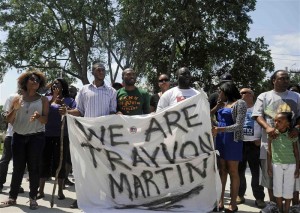 The neighborhood watch volunteer who shot and killed unarmed black Florida teenager Trayvon Martin has been so “emotionally crippled” by the racially charged case that he may no longer be in control of his actions, his attorneys said on Tuesday.
The neighborhood watch volunteer who shot and killed unarmed black Florida teenager Trayvon Martin has been so “emotionally crippled” by the racially charged case that he may no longer be in control of his actions, his attorneys said on Tuesday.
Lawyers Craig Sonner and Hal Uhrig said they had not heard from George Zimmerman since Sunday and that they could no longer claim to act as his legal representatives, since he had failed to take their phone calls or respond to emails since Sunday and had taken several recent actions without their advice.
Among other actions, they said Zimmerman had taken the unusual step on Tuesday of trying to personally contact Angela Corey, the special prosecutor who is handling his case and investigating the February 26 killing of 17-year-old Martin.
Uhrig, seeking to explain what he described as Zimmerman’s erratic behavior, said his client had been “emotionally crippled by virtue of the pressure of this case” which has sparked a nationwide public outcry.
“This has been a terribly corrosive process,” said Uhrig, who bridled at claims from civil rights activists and streets filled with indignant protesters that Zimmerman, a white Hispanic, was a racist who had gunned down an innocent African American youth in a case of racial profiling that turned suddenly tragic.
“George Zimmerman, in our opinion and from information made available to us, is not doing well emotionally,” Uhrig said.
“He may not be in complete control of what’s going on. We’re concerned for his emotional and physical safety,” he added.
Uhrig and Sonner spoke at a news conference outside the Seminole County Courthouse in Sanford, Florida, the town where Martin was killed.
Both lawyers said they had never met face-to-face with Zimmerman, but had been in regular contact with him before Sunday.
“He’s gone on his own,” Sonner said of Zimmerman, “I’m not sure what he’s doing and who he’s talking to,” he said.
He did not elaborate on the suggestion that Zimmerman had somehow gone rogue, after contacting a high-profile TV journalist and starting up a website to raise money for his legal defense.
But Uhrig disclosed for the first time that Zimmerman was in hiding somewhere outside of Florida after the shooting triggered protests calling for his arrest.
That prompted Benjamin Crump, a lawyer representing the Martin family, to say he believed Zimmerman was now a flight risk.
“Certainly, at this point he is (a flight risk),” Crump told Reuters. “Nobody knows where he’s at. He could leave the United States,” he said.
“The family is really concerned that the killer of their son is unaccountable. Nobody knows where he is. They are really concerned about whether Zimmerman will ever be brought to justice.”
PROSECUTOR SEEN MOVING QUICKLY
Corey, the special prosecutor, said in a statement that she would hold a news conference sometime later this week to discuss “new information” about the case but said nothing about Zimmerman’s whereabouts or emotional state.
Shortly before her statement was issued, Uhrig said he expected Corey to announce a decision in the case soon. Any legal filings in the case, including possible charges from the special prosecutor, would initially be filed in the Seminole County court, he said.
Uhrig and Sonner said Zimmerman’s attempt to phone Corey and speak to her directly on Tuesday was rejected out of hand by her office because he did so without legal counsel.
Zimmerman told police he shot Martin in self-defense. He has not been charged in the case and Sanford police said they found no evidence to contradict his account.
Police cited Florida’s “Stand Your Ground” law, which allows people to use deadly force against adversaries when they fear great bodily harm or death.
The decision by Zimmerman’s lawyers to openly question his behavior, and announce that they were no longer representing him unless specifically asked to do otherwise, marked the latest twist in a case that has captured national attention because of race and Florida’s controversial self-defense laws.
The website launched on Monday by Zimmerman, called therealgeorgezimmerman.com, offers one of the first publicly available comments from Zimmerman since he went into hiding after the shooting on February 26.
“I was involved in a life altering event which led me to become the subject of intense media coverage,” Zimmerman said.
“This case continues to get stranger as it goes on,” said David Weinstein, a former Florida state and federal prosecutor now in private practice in Miami.
Joe Tacopina, a New York lawyer who has handled a number of high-profile criminal defenses, said he would also drop a client that acted without his knowledge in the manner described by Zimmerman’s attorneys. But he faulted them for holding a press conference to address Zimmerman’s mental state.
“You’re not supposed to air attorney-client disputes via press conference,” Tacopina said.
“The lawyers may be overwhelmed by the scrutiny of this case as much as the defendant,” he added.
SANFORD, Florida (Reuters) – (By Tom Brown; Additional reporting by David Adams in Miami and Daniel Trotta in New York; Editing by Jackie Frank)





